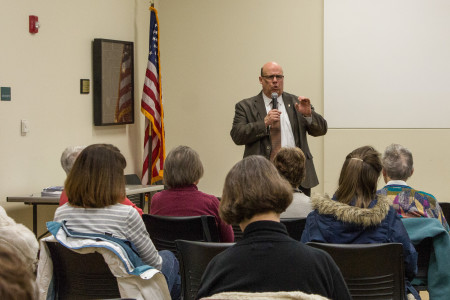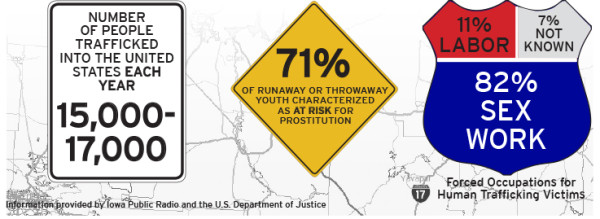Concerned citizens gathered to discuss human trafficking in Iowa at an event sponsored by the Grinnell League of Women Voters on Wednesday evening in the Drake Community Library.
Senior Criminal Investigator of the Iowa Department of Justice Michael Ferjak spoke to a crowd of 30 about the difficulties in raising awareness about human trafficking in Iowa and what steps need to be taken to address this growing problem.
“This is a topic that is oftentimes denied,” Ferjak said at the beginning of his hour-long address. “People say human trafficking is in New York City or Chicago … but Iowa has been described by a national expert as ‘the perfect hiding place for trafficking.’”
Ferjak said that to successfully address human trafficking, there needs to be a focus on enforcement, victim services and awareness.
“Of these three things, the one that will change the landscape the fastest is awareness,” Ferjak said. “Everyone in this room has a role to play.”
According to Ferjak, the first step is to get people to acknowledge that human trafficking happens in Iowa, and that trafficked children are not criminals but victims. Ferjak cited a 2008 study that showed that 75 percent of law enforcement believe that human trafficking does not exist in their jurisdiction.
“Chiefs, sheriffs, directors, they all think this,” Ferjak said. “They’ll tell me that it’s not here, or that it’s an isolated situation, or that ‘you’re just trying to call prostitution by a different name.’”
Ferjak said that many child sex trafficking cases “start with a child that has been thrown out of their home, or run away, or is in foster care.” He stated that transgender youth are disproportionately trafficked and are often below the radar in human trafficking discussions.
In Iowa between January 2011 and December 2013, there were on average 300 reports of missing children under the age of 18 every month. Ferjak cited a study that said that one third of these children will be approached within 72 hours to engage in commercial sex.
“This is 75 kids a month,” Ferjak said. “So why isn’t this being reported about? Because we don’t believe it is here.”
The state of Iowa has only recently begun to address human trafficking. In 2006, due to the leadership of former Iowa State Senator Maggie Tinsman, the legislature passed a law criminalizing human trafficking in Iowa. Last year, the legislature passed a law allowing trafficked children under the age of 18 to bypass the court and enter a Child in Need of Assistance hearing. These policy changes, however, do not address the shortcomings in the lack of training for law enforcement and other first responders—Ferjak is one of only two individuals in the state who trains law enforcement on the signs of human trafficking. However, Roxann Ryan, the new Iowa Department of Public Safety commissioner, has said that trafficking is a priority for her.
“This week I was in Des Moines to advocate for two bills that ask for funding [for training],” Ferjak said. “Legislators will ask how many cases [of human trafficking] we’ve had and I say I don’t know. That’s because each county in Iowa calls it something different.”
The problem of underreporting—and misreporting—human trafficking is not unique to Iowa. The FBI did not include indicators of human trafficking in their annual Uniform Crime Reports until January 2013.
Ferjak said that the most important point he tells to law enforcement and other officials during trainings is to “look for the absence of normal.” He told the audience to write down the number for the National Human Trafficking Hotline, 1-888-373-7888, and to call it if they see anything out of the ordinary.
“If you see something, say something,” Ferjak said. “The number is anonymous, just call and tell what you see, not what you think is happening.”
Six or seven years ago, Ferjak said, a trucker called the hotline and reported seeing young girls at a truck stop at the intersection of I-35 and I-90 in northern Iowa.
“Law enforcement followed up with his call and the resulting investigation broke an eight-state trafficking ring,” Ferjak said.
Enforcement is just one part of the equation, as victims’ services are also inadequate. Ferjak said that nationwide there are less than 400 beds in safe houses for trafficking victims and that the government does not pay for best practices in treatment, such as trauma-informed counseling.
As Director of the Human Trafficking Enforcement and Prosecution Initiative, Ferjak is working with former Iowa State Senator Maggie Tinsman and her organization ‘Braking Traffik’ to implement a school curriculum for sex trafficking education.
“I’m taking it statewide, it will be taught in schools by law enforcement and representatives from NGOs,” Ferjak said. “We are taking a multidisciplinary approach—victims services, awareness and enforcement.”



























































